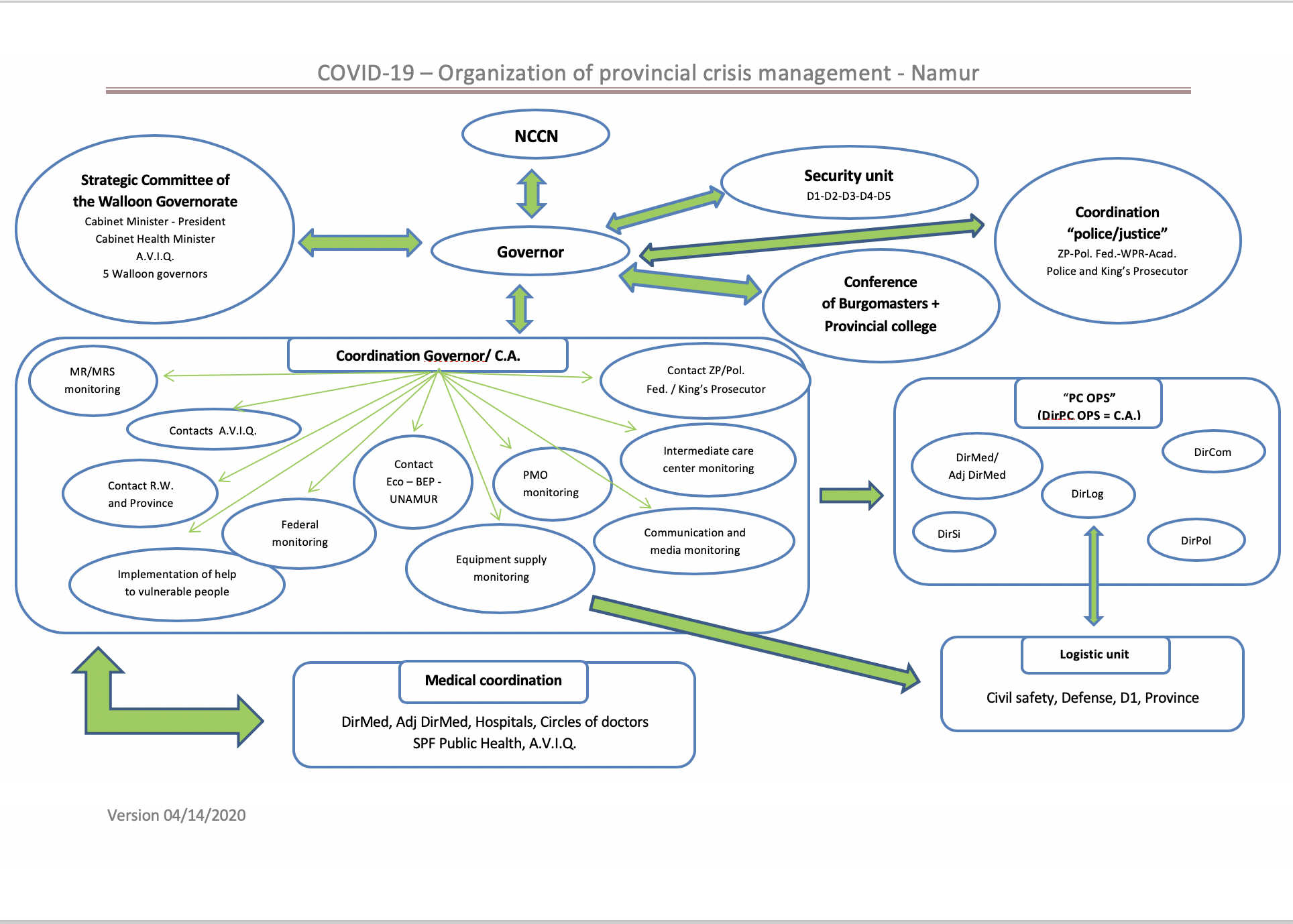
Feedback from Mr. MATHEN, Governor of the province of Namur, regarding the COVID19 crisis management
Management of Covid-19 crisis – Governor of the province of Namur
To remind you, in Belgium, the Governors (speaking French) are Commissioners of the Federal Government and federated entities (Walloon region and Wallonia-Brussels Federation), while being a provincial body (decentralization) with an information and control roles of territorial community which is the Province.
Thus, since the end of January, the Governor of the province of Namur asked that the Coronavirus issue be raised at the Kingdom's "conference of governors", which meets monthly. This meeting took place on the 5th of February. At this stage, and until March 12, the situation was managed at the federal level in a specific and monodisciplinary manner by Public Health.
Due to the complex federal structure of the Belgian State, Health is a competence treated on several levels:
- Federal (department of Public Health and of food chain security):
- Urgent medical assistance: childcare, psychosocial assistance, management of risks
- Hospitals: assistance organization in hospitals, registration systems, funding, statistics
- Healthcare network: mental health chronic diseases, rare diseases, federal hospital hygiene platform
- Healthcare quality: patient safety, pharmaceutical care, …
- Share of medical data
- Regions (including Walloon region):
- Ambulatory care
- Hospital care
- Environmental health
- Health observatory
- Medico-social infrastructures
- Prevention, promotion and monitoring of diseases
- Communities (including Wallonia-Brussels Federation) – power implemented via the Regions or via the provinces:
- Health promotion and prevention
- Vaccination and testing policies
- School medicine
The Governor continued to anticipate during this period the possible consequences of this health crisis from a multidisciplinary point of view and multiplied contacts and actions: towards local authorities (conference of burgomasters), with the provincial crisis unit, with all the other governors, with the regional executive, the Regional Health Agency (AVIQ) and the Wallonia-Brussels Federation (responsible for teaching), the National Crisis Center, etc.
It also involved taking measures in the field of public order for example (police orders prohibiting gatherings, etc.)
On the 12th of March, the National Security Council[1] declared a “federal crisis phase”, with specific management structures, managed by the National Crisis Center (organically dependent on the Ministry of the Interior) and generating at governor level the automatic meeting of the coordination committees they chair. It involves strategic coordination with the involved departments: firefighters, medical care, police, logistics (Defense, Civil Protection), information.
In the federal crisis phase, the Governor is responsible for implementing the measures decided by the federal level on the territory of the province; it relays local authorities and citizens, anticipates the consequences of the application of these measures, takes public order measures, ensures the strategic coordination of the actions of involved actors, provides a framework for the operational command post, establishes management procedures, monitors needs, resources and actions, manages information and communication (press releases and social networks).
This unprecedented crisis, with slow kinetics, somewhat changed our procedures and required the establishment by the Governor of a tightened coordination unit[2], grouping together his administration services, his cabinet, the district Commissioner and its Liaison Officer, taking into account prophylactic requirements, business continuity planning, while using new tools (videoconference systems, etc.) and adapted working methods (teleworking, etc.)
This is how he also participates in the daily videoconferences of the National Crisis Center, with all of his colleagues, but also in the regular videoconferences of the Walloon Regional Government, of the Provincial College (territorial collectivity) and the conference of burgomasters who he gathered in e-conference fifteen times since March 21.
However, for the Governor, the federal crisis phase is not limited to a simple application of measures decided by the federal coordinating committee. For example, it took several initiatives and had to show creativity in this management of the health crisis, with the establishment of original structures such as the Medical Orientation Stations (MOS)[3], general medicine stations located in front of hospitals. They allow guide patients sent by their attending physician or by the 1733 (on-call medical center) and quickly offer a solution that suits them: return home, general medicine consultation (on site) or hospital (emergency).
Calls for volunteers were broadcasted and had to be managed in this context, with all the logistical and administrative contingencies that this requires.
Specific missions have also been given to him by the Walloon Region by supporting the regional agency responsible for health (AVIQ - Walloon Agency for a Quality of Life) in the issue of rest homes (monitoring equipment supplies, staffing needs, etc.), but also by setting up alternative accommodation for vulnerable people (homeless, victims of violence in collective accommodation structures, etc.) and by coordinating resources at the level of local social action operators.
Denis MATHEN
Governor of the province of Namur
[1] See below The federal organization
[2] See Covid-19 organizational plan below
[3] See video
***************************
Federal organization – management of Covid19 crisis (www.info-coronavirus.be)
If the National Security Council takes political decisions, these are concretized by different interministerial, interdepartmental and interregional crisis units coordinated within a Federal Coordination Committee. Decoding and behind the scenes on the hard work of these people gathered in particular at the National Crisis Center (NCCN).
Dialogue between public health actors
Since January 2020 and the emergence of the COVID19 pandemic in China, three bodies have been meeting to monitor the health situation:
- The Risk Assessment Group (RAG) analyzes the risk for the population based on epidemiological and scientific data. Chaired by Sciensano, it is made up of Sciensano experts and health authorities.
- The Risk Management Group (RMG) relies on the advice of the RAG to take measures to protect public health. Chaired by the SPF Public Health, it is made up of representatives of the federal and federated health authorities.
- The Coronavirus Scientific Committee helps health authorities to fight coronavirus. The committee delivers a scientific opinion on the evolution of the virus and contributes to the optimal preparation of our country for the emergence of the new respiratory virus.
Since the federal phase, these consultative bodies transmit their opinions to an "Evaluation Unit" (CELEVAL). Chaired by the SPF Public Health, this unit is made up of representatives from Sciensano, the Scientific Committee on COVID19, the Superior Health Council, the administrations in charge of health within the Regions and Communities as well as the SPF Interior and Mobility. It issues a public health opinion to advise the authorities in making decisions to fight the pandemic.
Specific units to prepare and implement decisions
Given the significant impact of this pandemic on the whole socio-economic life, several crisis units have been set up in order to operationalize crisis management:
- The operational unit coordinated by the NCCN. Via its 24/7 Permanence, this unit promotes the flow of information between the authorities, ensures the operationality of crisis infrastructures and ensures the alert of crisis units if necessary.
- The socio-economic unit is chaired by the SPF Economy and is made up of representatives of the Ministers of Economy and Employment, Public Health and SMEs as well as the SPF Economy, Employment and Labor, Mobility, Social Security and SPP Social Integration. It analyzes and delivers opinions on the socio-economic impact of the measures taken or to be taken.
- The Information unit is co-chaired by the SPF Public Health and the NCCN. It ensures the coordination of all local, regional, community and federal authorities for consistency in crisis communication strategies and actions. It gives strategic advice to the competent authorities, relying its action on the perceptions of the population's information needs.
- The Legal units oversee the drafting of legal texts and provide answers to the many legal questions that arise in the context of this complex crisis management.
- The International unit facilitates the flow of information between counterpart crisis authorities at European level.
- The Integrated Police Task Force coordinates the actions of the police services.
Other units have also been activated, to implement decisions by answering to a series of frequently asked questions, or to ensure translations of published texts. Since Thursday March 19, the “Economic Risk Management Group” (ERMG) has also been set up to manage the economic and macroeconomic risks linked to the spread of COVID19 in Belgium.
Strategic and political bodies to make decisions
Since the beginning of this pandemic, the political authorities have taken decisions based on the recommendations of health experts.
- The National Security Council (NSC), composed essentially of the Prime Minister and the Deputy Prime Ministers, has been extended to the Minister-Presidents of Regions and Communities. This collegial body takes political decisions for the management of this crisis.
- The Federal Coordination Committee (FECOCO) is chaired by the NCCN. The specific management of medical aspects (hospital capacity, means of protection, tests, etc.) is coordinated by the SPF Public Health. FECOCO is made up of the President of the RMG and representatives of the Prime Minister, Federal Ministers of the Interior, Justice, Finance, Foreign Affairs, Public Health, Budget, Mobility, Defense, Employment and Labor, as well as Minister-Presidents of Regions and Communities. The following administrations are also represented: the SPF Public Health, Mobility, Economy and Defense, as well as the Regional Crisis Centers and the Federal Police. It prepares and coordinates at strategic level the implementation of the political decisions of the NSC.
To operationalize these strategic and political decisions, consultations are organized with the Provincial Governors, the Brussels High-Official and the Minister-President of the Brussels-Capital Region so that they can coordinate actions at the municipal level.
Experts from health authorities are constantly developing procedures for health professionals. They know how to quickly recognize a patient potentially infected with the coronavirus and what to do if necessary. The virus can be quickly identified in different laboratories. All hospitals in our country are able to treat patients safely.
************************

********************



